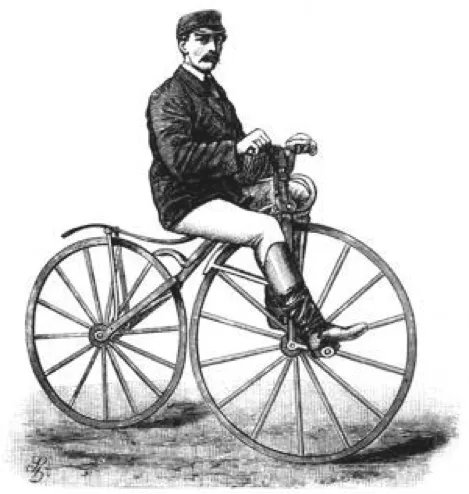In a groundbreaking move towards sustainable transportation, French entrepreneur Adrien Lelièvre has unveiled the Pi-Pop e-bike, a two-wheeler that shuns conventional lithium batteries in favor of a supercapacitor.
The innovative design not only addresses the environmental impact associated with traditional e-bike batteries but also offers a slew of advantages over its counterparts.
The History of Bicycles
The evolution of bicycles is a fascinating journey that spans centuries, showcasing the ingenuity and innovation of human transportation. The earliest precursor to the modern bicycle can be traced back to the 19th century, with the invention of the “running machine” or draisine.
This wooden, pedal-less device, created by Karl Drais in 1817, allowed riders to push themselves along using their feet. While lacking pedals, gears, and a chain, it laid the groundwork for future developments in bicycle design.

The mid-19th century witnessed a significant breakthrough with the introduction of pedals and a chain drive. In 1861, pedals were added to the front wheel by French blacksmith Pierre Michaux, creating the first true bicycle prototype. This design, known as the “boneshaker” due to its rigid frame and uncomfortable ride, marked a crucial step in the evolution of bicycles.
Subsequent innovations, such as the adoption of a metal frame and the development of the chain and sprocket system, contributed to improved stability and efficiency.
The late 19th century saw the emergence of the safety bicycle, a design that closely resembles the bicycles we use today. The safety bicycle featured a chain-driven rear wheel, a diamond-shaped frame, and air-filled rubber tires. This design not only enhanced comfort and safety but also made cycling more accessible to a broader audience.
With the introduction of the safety bicycle, cycling gained popularity as a recreational activity and a mode of transportation, sparking a cultural shift and laying the foundation for the bicycle’s enduring popularity.
In the 20th century, continuous technological advancements further refined bicycle design. The introduction of lightweight materials, multiple gears, and aerodynamic features improved speed, efficiency, and overall performance.
Additionally, the development of specialized bicycles for various purposes, such as mountain biking, road cycling, and commuting, reflected the diverse needs and preferences of riders. Today, bicycles continue to evolve with ongoing advancements in materials, design, and technology, solidifying their place as an efficient, sustainable, and versatile mode of transportation.
This leads us to the newly developed Pi-Pop e-bike.
Pi-pop Technology, Design, Costs
The Pi-Pop e-bike is not just a visionary idea, but a tangible reality that fits into the e-bike market with a clear objective: sustainability and practicality.
With a city-ready unisex frame and a front suspension that cushions every urban bump, this bike is ready to turn every journey into an enjoyable and environmentally friendly experience.
The Aikema Electric Drive Systems motor that equips the Pi-Pop is an example of lightweight and efficient engineering. Together with the seven-speed Shimano Tourney gearbox and Tektro disc brakes, this e-bike offers a smooth and responsive riding experience, ideal for the urban environment. The frame’s step-through design facilitates access, making the Pi-Pop suitable for a wide audience of cyclists.
The e-bike features a sleek white design and weighs approximately 48 lbs (21.7 kg), making it suitable for riders with heights ranging from five to six feet (155 to 185 cm). Designed to accommodate both men and women, it offers 24/7 electric assistance, propelling riders at speeds of up to 15.5 m/h (25 km/h) with its 250W, 45N.m motor. It is also equipped with mudguards for added convenience.
The arrival of the Pi-Pop on the market raises interesting questions about the future of e-bikes and sustainable mobility in general. This innovation could push other manufacturers to explore alternatives to traditional batteries, reducing reliance on rare metals and improving the ethics of production.
With a price of €2,450 (AUD 4071), the Pi-Pop is an initial investment that pays for itself over time, not only in economic but also in environmental terms.
Supercapacitor Magic
The Pi-Pop e-bike employs a supercapacitor to store and release energy electrostatically, contrasting with the chemical reactions in lithium batteries. This enables the supercapacitor to rapidly accumulate and discharge energy, providing instantaneous assistance during challenging rides. As a rider pedals, the system charges, and during braking, thanks to engine braking, surplus energy is returned, creating a seamless and efficient cycling experience.
Pi-Pop’s revolutionary e-bike boasts a cutting-edge energy storage system which is not only eco-friendly but also fully recyclable.
Sustainable Solution
Unlike lithium batteries that necessitate resource-intensive mining procedures for elements like lithium and rare-earth materials, Pi-Pop’s supercapacitors are constructed from carbon, conducting polymer, aluminum foils, and pulp—materials with existing recycling processes.
Lelièvre emphasizes that the 20 kg Pi-Pop e-bike stands as a “symbol of sobriety,” rejecting the notion of incessant energy consumption and speed.
Environmental Impact and Longevity
With no reliance on rare-earth materials and a production process committed to sustainability, the Pi-Pop e-bike further distinguishes itself by eliminating the need for frequent charging.
The supercapacitor boasts a lifespan of 10 to 15 years, surpassing the typical five to six years of lithium batteries, providing users with a durable and eco-friendly transportation solution.
Localized Production and Future Ambitions
Currently assembled in Orléans, France, the Pi-Pop represents Lelièvre’s commitment to retaining control over production and supporting local jobs. The company, STEE, currently produces 100 bikes monthly and aims to increase production to a thousand bikes per month by 2024.
Lelièvre envisions expanding beyond national borders, with plans to enter the European market by 2025, underscoring the potential of this innovative and sustainable mode of transportation.
Industry Outlook
The arrival is timely, considering the European Union’s significant import and export figures for e-bikes.
With ambitions to contribute to the growing demand for eco-conscious alternatives, the bike could revolutionize the e-bike market, offering a compelling solution that aligns with the principles of sustainability, durability, and efficiency.
As the world grapples with the environmental impact of traditional transportation methods, Pi-Pop emerges as a beacon of hope, paving the way for a greener and more sustainable future in the realm of electric bicycles.


